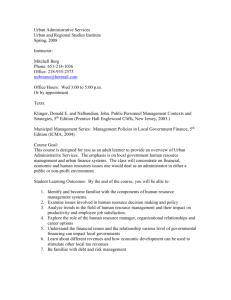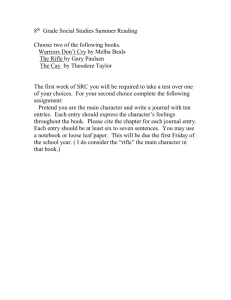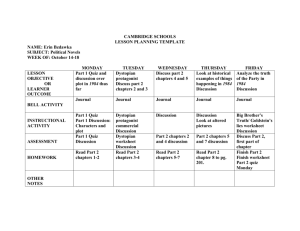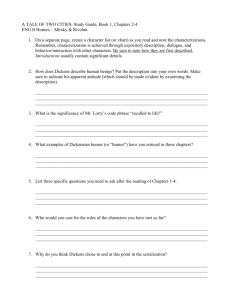Syllabus - Department of English
advertisement
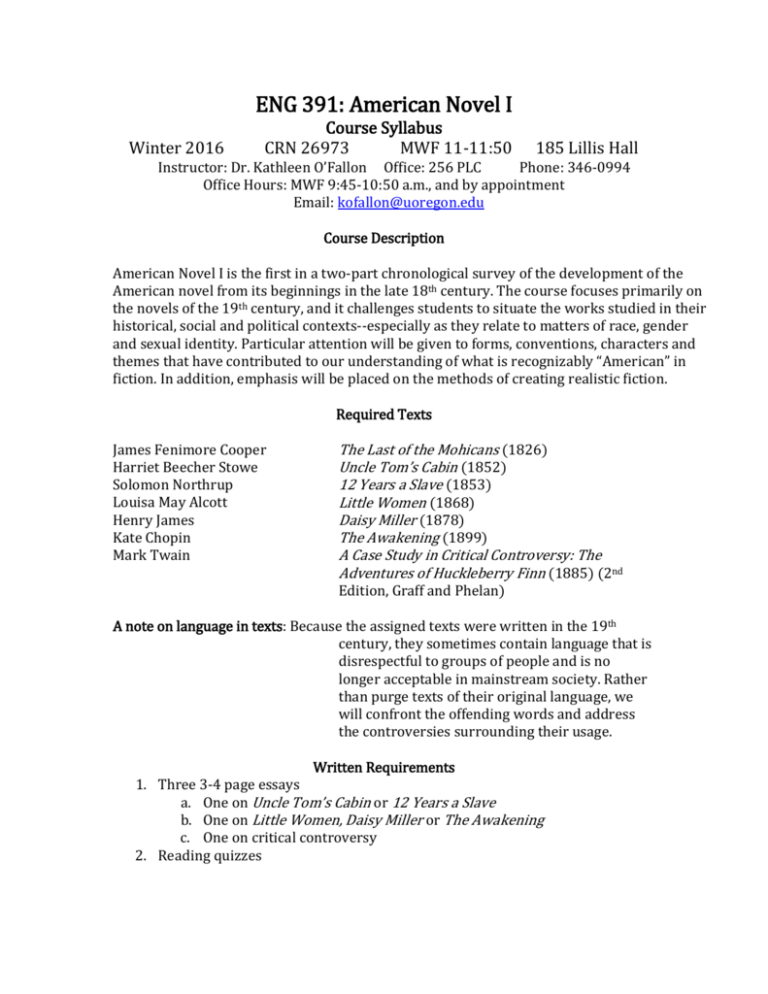
Winter 2016 ENG 391: American Novel I Course Syllabus CRN 26973 MWF 11-11:50 185 Lillis Hall Instructor: Dr. Kathleen O’Fallon Office: 256 PLC Phone: 346-0994 Office Hours: MWF 9:45-10:50 a.m., and by appointment Email: kofallon@uoregon.edu Course Description American Novel I is the first in a two-part chronological survey of the development of the American novel from its beginnings in the late 18th century. The course focuses primarily on the novels of the 19th century, and it challenges students to situate the works studied in their historical, social and political contexts--especially as they relate to matters of race, gender and sexual identity. Particular attention will be given to forms, conventions, characters and themes that have contributed to our understanding of what is recognizably “American” in fiction. In addition, emphasis will be placed on the methods of creating realistic fiction. James Fenimore Cooper Harriet Beecher Stowe Solomon Northrup Louisa May Alcott Henry James Kate Chopin Mark Twain Required Texts The Last of the Mohicans (1826) Uncle Tom’s Cabin (1852) 12 Years a Slave (1853) Little Women (1868) Daisy Miller (1878) The Awakening (1899) A Case Study in Critical Controversy: The Adventures of Huckleberry Finn (1885) (2nd Edition, Graff and Phelan) A note on language in texts: Because the assigned texts were written in the 19th century, they sometimes contain language that is disrespectful to groups of people and is no longer acceptable in mainstream society. Rather than purge texts of their original language, we will confront the offending words and address the controversies surrounding their usage. Written Requirements 1. Three 3-4 page essays a. One on Uncle Tom’s Cabin or 12 Years a Slave b. One on Little Women, Daisy Miller or The Awakening c. One on critical controversy 2. Reading quizzes Oral Requirements 1. Regular participation in class discussion 2. Significant contributions to group presentation Schedule of Assignments Jan. 4 Jan. 6 Jan. 8 Week One Introductions Background on the novel/captivity narratives The Last of the Mohicans, Chapters 1-10 Week Two Jan. 11 The Last of the Mohicans, Chapters 11-25 Jan. 13 The Last of the Mohicans, Chapters 26-33; READING QUIZ Jan. 15 Mark Twain, “Fenimore Cooper’s Literary Offenses” Week Three Jan. 18 MLK Day Observed: NO CLASS Jan. 20 Uncle Tom’s Cabin, Chapters 1-15 Jan. 22 Uncle Tom’s Cabin, Chapters 16-30 Week Four Jan. 25 Uncle Tom’s Cabin, Chapters 31-45; READING QUIZ Jan. 27 Group organizational meeting Jan. 29 12 Years a Slave, Introduction and “What Is an African American Classic?” Feb. 1 Feb. 3 Feb. 5 Feb. 8 Feb. 10 Feb. 12 Feb. 15 Feb. 17 Feb. 19 Feb. 22 Week Five 12 Years a Slave, Chapters 1-7 12 Years a Slave, Chapters 8-15 12 Years a Slave, Chapters 16-22, plus “Appendix”; READING QUIZ Week Six Little Women, Part I, Chapters 1-12 Little Women, Part 1, Chapters 13-23; READING QUIZ Group meetings; Deadline for Essay #1 Week Seven Daisy Miller, entire novel; READING QUIZ Daisy Miller, entire novel The Awakening, Chapters I-XVII Week Eight The Awakening, Chapters XVIII-XXXIX; READING QUIZ Feb. 24 Feb. 26 Feb. 29 March 2 March 4 March 7 March 9 March 11 The Adventures of Huckleberry Finn, Chapters I-XI The Adventures of Huckleberry Finn, Chapters XII-XXIV Week Nine The Adventures of Huckleberry Finn, Chapters XXV-Last; READING QUIZ Group meetings; Deadline for Essay #2 Group meetings Week Ten (“Dead Week”) Presentation: The Controversy over the Ending Presentation: The Controversy over Race Presentation: The Controversy over Gender and Sexuality March 16 (Wednesday) Finals Week: March 14-18 Final paper (on critical controversy) due by NOON in 256 PLC Desired Learning Outcomes Assignments in this class give students opportunities to practice skills that the English Department has designated as “desired learning outcomes” for the undergraduate major. These outcomes include: 1. to read literary and cultural texts with discernment and comprehension and with an understanding of their conventions; 2. to draw on relevant cultural and/or historical information to situate texts within their cultural, political and historical contexts; 3. to perform critical, formal analyses of literary, cinematic and other cultural texts; 4. to write focused, analytical essays in clear, grammatically correct prose; 5. to employ logic, creativity and interpretive skills to produce original, persuasive arguments; 6. to employ primary and/or secondary sources, with proper acknowledgment and citation, as they contribute to a critical essay’s thesis. To these department objectives, I have added the following: 7. to contribute meaningfully to a shared classroom culture of vigorous and respectful discussion; 8. to work productively in small group situations; 9. to take a significant role in a formal group presentation. Policy on Plagiarism and Academic Dishonesty All work submitted in this course must be your own and must be written exclusively for this course. The use of sources (ideas, quotations, and paraphrases) must be properly documented. Refer to the summary of the Code of Student Conduct in the Schedule of Classes. In cases where plagiarism has been clearly established, the award of an F for the final course grade is my standard practice. It is simple to discover if a paper has been “borrowed” from the Internet, so don’t underestimate my ability to spot plagiarism. Please talk to me if you have any questions about your use of sources before you turn in something that might be questionable. Policy on Late Papers, Make-up Quizzes and “Incompletes” If exigent circumstances cause problems with the due date for the essays, you must discuss this with me BEFORE the deadline so that arrangements can be made. Reading quizzes are listed on the class schedule, and if you miss one it cannot be made up. However, since the lowest quiz grade will be dropped when figuring your grade, missing a quiz will not necessarily hurt you. Late work that is not cleared with the instructor prior to the due date will not be accepted. Students who miss a significant number of class sessions and/or fail to turn in work on time cannot expect to make up everything at the last minute. Being actively present and engaged with the work of the class throughout the term is required for a passing grade. A final grade of “incomplete” can only be granted if a student has turned in at least 50% of the required work when s/he requests this option. Students requesting an “incomplete” must come to the instructor with a written proposal detailing when and how they intend to complete all required work for the course—including a plan for fulfilling the class participation component of the course. Policy on Disabilities Students with physical or learning disabilities should consult the instructor as soon as possible so accommodations can be made. Grades Each of the following requirements has weight in determining your grade: Essays (60%) Reading Quizzes (20%) Attendance and Participation (20%) Note: This grade includes participation in the group presentation. Questions regarding grades should be addressed during office hours, NOT through email. Expressing concerns as a desire to learn rather than to obtain what you “deserved’ or “expected” will set a productive tone for such discussions. Please understand that an instructor assigns grades based on what has been turned in, not on how hard a student thinks s/he has worked on an assignment or on the grades students may have earned in other classes. However, writing multiple drafts of essays, consulting with the instructor during office hours, and carefully revising of essay drafts should lead to more polished work that makes a positive impression on the evaluator/reader. Attendance and Participation Students are expected to be in class, on time, having read the materials assigned for that day and having done any required writing. Assignments are due when class begins. Attendance will be taken every day. It is your responsibility to sign in on the attendance sheet for yourself only. More than three absences will result in a one-half grade penalty in the final course grade. Attending class is a choice you have to make on your own, and that means you have to accept the consequences of that choice. I do not distinguish between excused and unexcused absences, except in two cases: 1. Illness so severe and prolonged that a doctor officially excuses you. 2. You are involved in a university-sanctioned activity. Written proof of these excuses is required, but there is no need to explain your reasons for other absences. Emailing me that you are going to miss does not excuse you from class. If you know you are going to miss a class, make advance arrangements with me to turn in any work that is due and/or to pick up handouts. Ask a classmate to catch you up on discussion that you will miss. If you have an unplanned absence, see me as soon as you return to pick up missed handouts, and ask a classmate for any missed notes. If you have questions about material discussed while you were gone, come to my office hours. We will have carried on in your absence, so please don’t be arrogant enough to ask if you missed anything. Of course, you did. RULES OF CIVIL DISCOURSE FOR THE CLASSROOM Do your homework, so you are adequately prepared for discussion. Regular reading quizzes are designed to make sure you are keeping up with the reading. Raise your hand politely (that is, don’t wave it around like a first grader who needs to go to the bathroom or extend it aggressively when you hear something you disagree with) and wait to be recognized by the teacher before speaking. Listen actively (but silently)—don’t just wait for someone else to take a breath so you can jump in with your opinion. Avoid interrupting others. Don’t assume that you need to add your “two cents’ worth” on every aspect of discussion. You can learn by letting others take the lead sometimes. If you raise your hand on every question, what you say may begin to be de-valued by your peers. If you tend to be shy about speaking up in class, set yourself a goal: I will say something once a week. To help you feel more confident, write out what you want to say. State your ideas as concisely as possible, staying focused and avoiding repetition. When you make strong claims, be ready to point to specific places in the text that back up your ideas. Don’t be like some political candidates—cultivate a close relationship with the facts. Ask good questions, and remain as open-minded as possible. Acknowledge other points of view even as you prepare to express your own opinion. (This shows that you have heard what the other person has said.) Avoid one-on-one arguments that dominate the discussion without moving it forward. Keep discussion focused on ideas, not personalities. . . . AND OBSERVE A FEW RULES OF SIMPLE COURTESY: Turn off your cell phone and other electronic devices before class begins. (Exception: if you are using an electronic version of the text.) Don’t distract others by talking while someone else has the floor. Be on time. If you must be late, be quiet and unobtrusive as you enter the classroom. Don’t walk in front of the instructor while she is conducting the class. Once you’re in, stay in. Take care of getting snacks and using the restroom before class or during designated breaks. If you absolutely cannot wait to use the restroom or get a drink of water, leave your cell phone in plain sight on your desk before you exit the classroom. Statement Regarding Sexual Harassment The UO is committed to providing an environment free of all forms of discrimination and sexual harassment, including sexual assault, domestic and dating violence, and gender-based stalking. If you or someone you know has experienced or is currently experiencing gender-based violence (intimate partner violence, attempted or completed sexual assault, harassment, coercion, stalking, etc.), know that you are not alone. UO has staff members trained to support survivors in navigating campus life, accessing health and counseling services, providing academic and housing accommodations, helping with legal protective orders, and more. Please be aware that all OU employees are required reporters. This means that if you tell me about a situation, I may have to report the information to my supervisor or the Office of Affirmative Action and Equal Opportunity. Although I have to report the situation, you will still have options about how your case will be handled, including whether or not you wish to pursue a formal complaint. Our goal is to make sure that you are aware of the range of the options available to you and that you have access to the resources you need. If you wish to speak to someone confidentially, you can call 541-346-SAFE, UO’s 24hour hotline or visit the website at safe.uoregon.edu.

